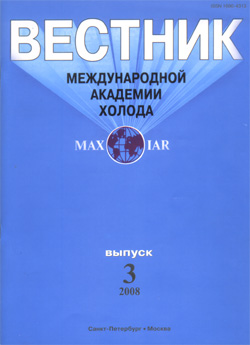
Capacity control of refrigeration screw compressor

Annotation
Different ways of refrigerant screw compressor capacity control are analyzed. Low effectiveness of modern ways of control is shown. Estimation criteria for screw profiles geometry are proposed: reduced relative length of screw contact line and reduced relative area of discharge port. Comparison of screw profiles with different geometry and different numbers of teeth is made. Perspective method of capacity control and geometrical compression ratio by valve and swinging dampers is discussed. Comparison of work loss for refrigerant screw compressor with different numbers of teeth with the ones with different screw profiles during discharge process is made. Compressors are operated at R22 and R717 refrigerants, the capacity control being made by one valve and valve with swinging dampers. Research of refrigerant screw compressor with potential regulator allows determining the law of geometrical compression ratio variation as compressor capacity is being decreased, when the indicated efficiency is increased up to 40 % compared to the compressor with capacity adjuster in the form of one valve.
Keywords
Постоянный URL
Articles in current issue
- Storage stability and DPPH scavenging capacity of polyphenols of Mongolia Scotch Pine
- HPLC analysis of carotenoids in particular carrot (Daucus Carota L.) cultivars
- Plant raw material extraction with periodic intensive hydrodynamic regime
- Biotechnology of products from fish waste for elderly nutrition
- Brettanomyces yeast use in brewing
- Prospective trends in cheese and butter manufacturing for Black Earth region dairy cluster
- Lithium bromide absorption refrigerating machines charged with helium for air conditioning and condensation
- Organization efficiency estimation of biological objects fast freezing combined method
- Equipment modeling to reduce technological processes power consumption
- Energy saving system absorption refrigerating machine of ammonia s ynthesis installation: performance analysis and thermodynamic perfection evaluation
- Adaptation of the principle of control according to the deviation and disturbance results to air-conditioning systems
- Simulation of cryogenic thermocompressor performance with non-isothermal gas volumes
- Exergy analysis of the line complex two-stage processing of oilseeds
- Simulation of pulsated separated turbulent gas flow with positive pressure gradient in refrigerating systems channels
- Impact of preserving agents upon on intracellular meтaboliс changes during cryoconservation of human bone marrow
